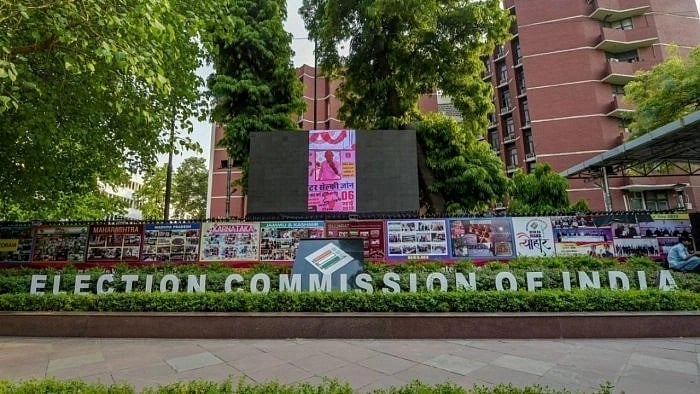
The Election Commission of India office.
Credit: PTI File Photo
A recent exchange of letters between the Election Commission (EC) of India and Congress president Mallikarjun Kharge throws light on some issues that have come up in the conduct of the ongoing Lok Sabha elections and the opposition parties’ concern over the EC’s handling of the issues. Some of those issues are actually the creation of the EC itself, and Kharge mentioned them in a letter to leaders of other opposition parties. These related to the failure of the EC to make public the voting figures of the first and second rounds of elections in time and the format in which they were published. The Election Commission chose to write to Kharge on the issues he mentioned though his letter was not addressed to it. Kharge replied to the EC, questioning its claims in its letter and expressing concern over the content of the letter and its tone and tenor.
The Election Commission described Kharge’s letter on the reported discrepancies in the voting data as an “attempt to push a biased narrative under the guise of seeking clarifications” and told him to “exercise caution and refrain from making such statements”. It also said that making public his letter to other leaders was “highly undesirable” and was designed to “create confusion, misdirection and impediment to the conduct of smooth, free and fair elections.” It said Kharge’s letter could create an anarchic situation and that the Congress president was trying to create a false narrative through insinuations and innuendo. Such remarks and serious charges are highly inappropriate from the EC. Political parties bring to the attention of the Election Commission and the public various issues related to the election and even criticise the conduct of the election. There is nothing wrong in airing such concerns in public because elections are a public activity. What Kharge told other leaders is what the EC had already been apprised of. There has been criticism of the EC’s handling of election data in the public realm.
In his reply to the EC, Kharge has said that while the EC has talked about free and fair elections, it has not shown any urgency to take action against communal statements and hate speeches by ruling party leaders. The EC has been criticised for its alleged partisanship and bias in favour of the ruling party and for not taking action on complaints against Prime Minister Narendra Modi and other senior BJP leaders. At the same time, it is issuing warnings to the leader of the largest opposition party. The EC is expected to answer the charges made against it by political parties with facts and with reference to procedures and conventions, explain the actions taken by it on their complaints and concerns, and do it all with dignity commensurate with an independent constitutional body. It should not indulge in a shouting match and mudslinging, much less in issuing warnings to opposition leaders. Aggressive and intimidating postures will further erode its credibility.
